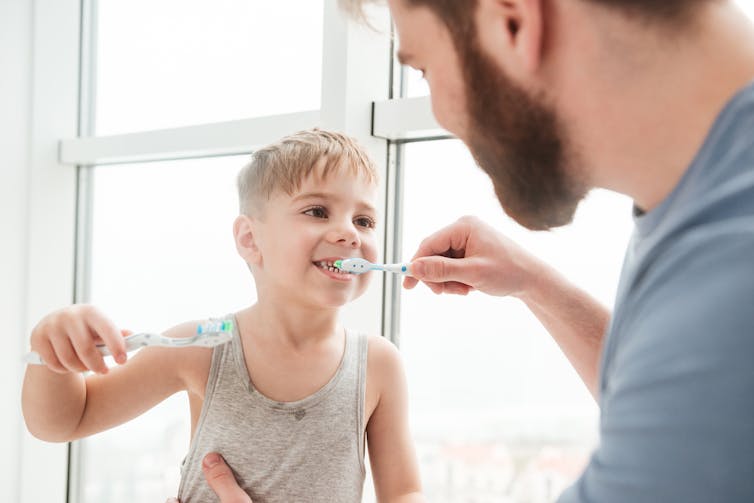How to (gently) get your child to brush their teeth
- Written by Rebecca English, Lecturer in Education, Queensland University of Technology
For most parents, the phrase “I don’t want to brush my teeth” is rather familiar. While it may seem easiest to pry their mouth open and force them to brush, research suggests there are better ways that may positively influence children’s future dental health.
So, what does the literature say you should do to help children brush their teeth?
What is gentle parenting?
Gentle parenting centres around respect for the child. Parents who practise this approach generally avoid artificial or extrinsic rewards or punishments.
These parents try to help their children habituate appropriate, or what we would call “good”, behaviours. The idea is the child should want to do the “right” thing for its own sake, not because it’s accompanied by a reward or because of the threat of a punishment.
Studies suggest this method is effective because children will go on to have superior social skills and fewer behavioural problems. The effect is believed to continue into adulthood.
Contrary to popular belief, this style of parenting does not eschew “consequences”. Rather, consequences are allowed to flow naturally from behaviour. Although, in the case of dental hygiene, we can’t let the natural consequence of not brushing lead to caries. So, what can you do?
Read more: 'Gentle parenting' explainer: no rewards, no punishments, no misbehaving kids
When should you start encouraging dental hygiene?
One of the ways to ensure children brush their teeth, without resorting to bribes or punishments, is to start early. Dentists suggest brushing baby’s first teeth when they appear, even wiping gums, may help establish good dental hygiene early.
By starting early with dental care, it will become an established part of life and may cause fewer power struggles.
 Let your child brush your teeth, and you theirs.
from www.shutterstock.com
Let your child brush your teeth, and you theirs.
from www.shutterstock.com
Does routine help?
Routine is said to be essential in children’s lives. Studies suggest routine can positively impact on children habituating positive behaviours because of the repeated exposure.
Families who provide a loving and consistent structure are more likely to have children who brush their teeth. Studies suggest taking a gamification approach creates an environment of fun around the routine of toothbrushing, creating better long-term oral hygiene.
Read more: How to discipline your children without rewards or punishment
Common areas that cause problems with brushing
One common issue is toothpaste. Children report not liking the taste or it making them feel funny. If your child won’t use toothpaste, but is otherwise OK with brushing, dentists recommend making the paste optional.
There are also many other flavours on the market besides mint, which some children may prefer to use and which may reduce the issue with refusal to brush their teeth.
But changing the toothpaste may not be enough. Studies suggest children’s refusal to brush teeth can create major family dramas, and parents report tooth brushing as a major site of power struggles. But effective behaviour management leads to children with fewer caries and healthy mouths.
Read more: Children's toothpaste: the facts
Practical measures
When children refuse to brush their teeth, we can employ respectful methods to encourage them to develop good dental hygiene. Dentists report positive parent-child interactions and the use of positive discipline can result in good teeth brushing behaviour.
One example is having a special song that is sung only when the child allows their parent to brush their teeth.
Another strategy is reading stories about teeth brushing so children understand the importance of good dental hygiene.
Some suggest allowing your child to carefully brush your teeth, and then you can have a turn at theirs. This approach gives the child power and allows them to explore their feelings about having their teeth brushed.
Making it a game is another strategy. Perhaps you and your child can have a competition to see who can make the most spit at the end or whether you can count all your teeth as you go. Another option is to let the child start by brushing their toy’s teeth.
Having our children learn to brush their teeth in a calm and gentle way, without threats or rewards, is essential, with one dentist suggesting dental phobia is a problem when children have negative experiences at the dentist because of early childhood caries. Dental phobia is a fear of the dentist that prevents people with dental issues seeking help from a dentist.
These strategies can help children who are resistant to brushing to engage positively with dental hygiene. This approach takes longer than prying their mouths open and forcing them to have their teeth brushed, because you’re asking your child to engage with something they’re resisting. But the value is they will habituate good dental hygiene practices and you can end power struggles over teeth brushing.
Authors: Rebecca English, Lecturer in Education, Queensland University of Technology
Read more http://theconversation.com/how-to-gently-get-your-child-to-brush-their-teeth-102713




